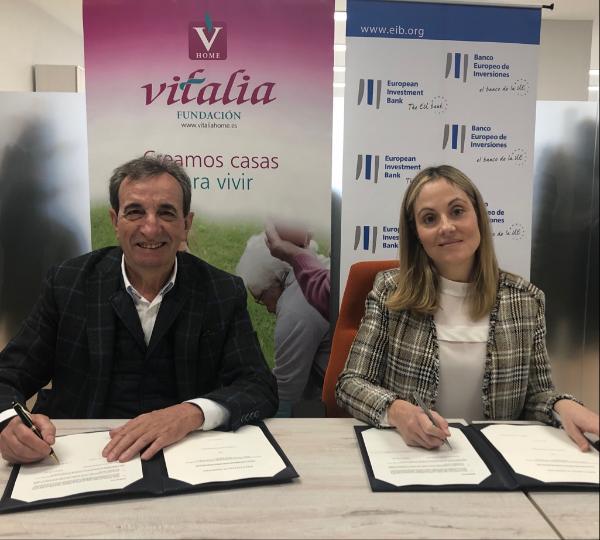
- The centres will provide some 3 200 residential places and more than 500 daycare places
- Employment impact: the agreement will help create almost 1 400 jobs
- The project will help to develop the “Homes to live in with gardens ” residential model for integrated people-centred care
- Climate action: the buildings for the new centres will be energy efficient with near-zero energy consumption
- The investment is being supported by the Juncker Plan
The European Investment Bank (EIB) is helping to improve elderly care in Spain by means of an agreement to finance the construction of 19 new retirement homes. To do so, the EU bank will be providing Vitalia Home with a loan of EUR 57.5m to help set up these new centres using the Homes to live in with gardens model developed by the Spanish company, which is intended to improve living spaces and care for the elderly. The agreement, which was signed today at the company’s headquarters in Zaragoza by EIB Vice-President Emma Navarro and the CEO of Vitalia Home Chema Cosculluela, is being backed by the Investment Plan for Europe, also known as the “Juncker Plan”.
The new residences will be located in Madrid, Catalonia, Castilla y León, Valencia and Murcia. In total, this new infrastructure will provide 3 200 new places for residents and more than 500 places for people who only require daycare. The investments will help to implement the innovative Homes to live in with gardens residential model, which is focused on integrated people-centred care. With this in mind, the new retirement homes will include co-living units (houses): homely spaces for groups of 15 to 20 elderly people. Direct access from these houses to terraces or gardens will allow residents to enjoy regular open-air co-living.
The buildings housing these new residences will be Nearly Zero Energy Buildings (NZEB), i.e. buildings with very low energy consumption owing to their design and the materials used in their construction. These energy efficiency measures mean that the annual CO₂ emissions of these centres is 1 330 tonnes less than an ordinary building, which contributes to climate action, another of the EU bank’s priorities.
The new retirement homes will become operational in the next three years. Some 1 000 people will be employed to build them, and they will employ around 1 400 workers – mostly women – once operational. Indeed, women make up nearly 90% of the workforce at Vitalia Home, which employs 3 350 people.
At the signing ceremony today in Zaragoza, EIB Vice-President Emma Navarro said: “Supporting the healthcare sector is fundamental, not just because of its economic importance and potential, but also because of its social relevance. This is why we are delighted to support investments such as the one we are financing today, which are needed to ensure the availability of infrastructure that will allow us to meet the growing care requirements of our elderly people with services of the highest quality. Thanks to this project, more than 3 000 people will receive care at centres designed to focus on improving users’ quality of life, with energy efficiency measures that help to protect the environment.”
Paolo Gentiloni, European Commissioner for Economy, remarked: “I am very pleased that the European Union is providing this financing, worth EUR 57.5 million, to Vitalia Home. The care and welfare of elderly people are fundamental. The project will create 3,200 places in 19 new retirement homes over the next three years, with an emphasis on open-air co-living. Moreover, the centres will meet EU energy efficiency targets and will create some 1,400 new jobs for caregivers.”
Chema Cosculluela, CEO of Vitalia Home stated: “The Vitalia Home expansion plan is more than just growing the number of centres and places. It constitutes a radical transformation. We are going to build 30 new centres that are very different from existing elderly care centres. Friendly spaces and a homely feel will help to prevent the harmful effects of overcrowding and institutionalisation. We are not satisfied with simply guaranteeing quality of care, but want to make people happy and to ensure their emotional well-being as well as their physical well-being, offering the chance of positive co-living and a satisfying life. We want elderly people to see our centres as a place to live that is as close as possible to a house and a home.”
Background information
Vitalia Home
Vitalia Home runs 57 centres offering 8 200 residential places and employing 3 350 people. In addition to this first expansion phase financed by the EIB, Vitalia Home aims to reach 15 000 residential places, which would enable 3 500 new jobs to be created.
Vitalia’s Homes To Live in With Gardens model is intended to provide large, bright, accessible spaces to encourage resident mobility and safety, combined with innovative technology to eliminate physical and pharmacological limitations. Personal tutors for each resident, choice of menu, interaction of family members with centre life through services such as dining halls and apartments for families, proximity and access to surroundings and a focus on technological innovation and research are other essential elements of this model.